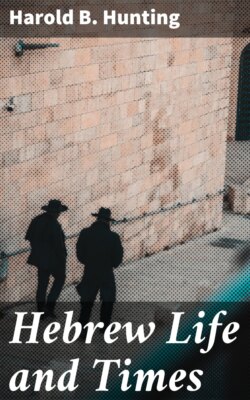Читать книгу Hebrew Life and Times - Harold B. Hunting - Страница 7
На сайте Литреса книга снята с продажи.
Trips to Town
ОглавлениеAmong the most interesting events in the lives of the shepherds were their trips to town, when they sold some of their wool and bought grain, and linen cloth, and trinkets for the babies, and the things they could not find nor make on the grassy plains. The raw wool was packed in bags and slung over the backs of donkeys. On other donkeys rode two or more of the men of the tribe. Sometimes, perhaps, a small boy was taken along on the donkey's back behind his father to see the sights. And for him the sights must have been rather wonderful—the great thick walls of the town, the massive gates, the houses, row on row, and the people, more of them in one street than in the whole tribe to which he belonged!
The market.—They took their wool, of course, to the open square where all the merchants sold their goods. Soon buyers appeared who wanted wool. It was a long process then, as now, to strike a bargain in an Oriental town. It is very impolite to seem to be in a hurry. You must each ask after one another's health, and the health of your respective fathers, and all your ancestors. By and by, you cautiously come around to the subject of wool. How much do you want for your wool? At first you don't name a price. You aren't even sure that you want to sell it. Finally you mention a sum about five times as large as you expect to get. The buyer in turn offers to pay about a fifth of what it is worth. After a time you come down a bit on your price. The buyer comes up a bit on his. After an hour or two, or perhaps a half a day, you compromise and the wool is sold.
Weighing out the silver or gold.—In those early days there was no coined money. Silver and gold were used as money, only they had to be weighed every time a trade was put through; just as though we were to sell so many pounds of flour for so many ounces of silver. The weights used were very crude; usually they were merely rough stones from the field with the weight mark scratched on them. The scale generally used was as follows:
60 shekels = 1 mana.
60 manas = 1 talent.
The shekel was equal to about an ounce, in our modern avoirdupois system. There was no accurate standard weight anywhere. Honest dealers tried to have weights which corresponded to custom. But it was easy to cheat by having two sets of weights, one for buying and one for selling. So when our shepherds came to town, they had to watch the merchant who bought from them lest he put too heavy a talent weight in the balance with their wool, and too light a shekel-weight in the smaller balance with the silver.
